SIR JULIAN THE APOSTATE: Doomed Knight, Tragic Hero
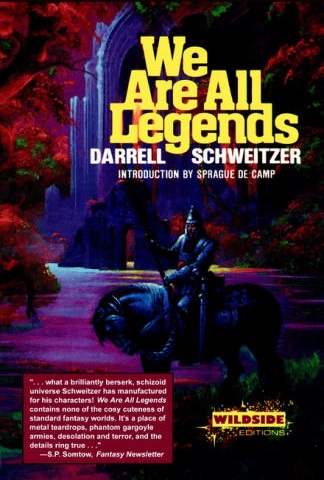 Swords Against Darkness.
Swords Against Darkness.
Heroic Fantasy.
The Year’s Best Horror Stories.
Distant Worlds.
Alien Worlds.
Void.
What sword-slinging hero appeared in all of these anthologies and magazines (and more) before his adventures were collected into a single impressive volume? The answer is Sir Julian the Apostate, a knight fallen from grace, and as doomed a hero as you’ll find in the history of sword-and-sorcery fiction. For swashbuckling fantasy as dark and seductive as a vampiric lamia, look no further than the saga of Sir Julian, as chronicled in Darrell Schweitzer’s WE ARE ALL LEGENDS.
The twelve stories comprising the book were first published between 1976 to 1981, definitely a “golden age” for sword-and-sorcery novels, magazines, and comics. Yet unlike much of what was published during the S&S “boom” of the era, Schweitzer’s tales of Sir Julian and his weird fate are all timeless gems.
“It was in an old land that the battle had taken place; a country of empty halls and deserted castles where ruined walls stood protecting nothing from nothing, and roadways faded into the earth and led nowhere. For three days in this place the swords of the two armies sang their terrible song on shields and armor, and when the fighting was done and all was still, a deep fog covered the sodden ground.”
–WE ARE ALL LEGENDS
This cycle of related stories includes witches, demons, vampires, zombies, ghosts, and far stranger things. It blurs and then erases the line between fantasy and horror. The book’s main character enables Schweitzer to twist the whole “knight on a quest” idea into a deep strangeness all its own.Sir Julian is a medieval Crusader damned by God after he lays with a witch who is a minion of Satan. The metaphorical seduction of evil is represented here by the seductive power of the cursed hag who is far more than she seems to be. The anti-sexual religious mores that lead to temptation and damnation are artfully represented here by the witch and her curse.
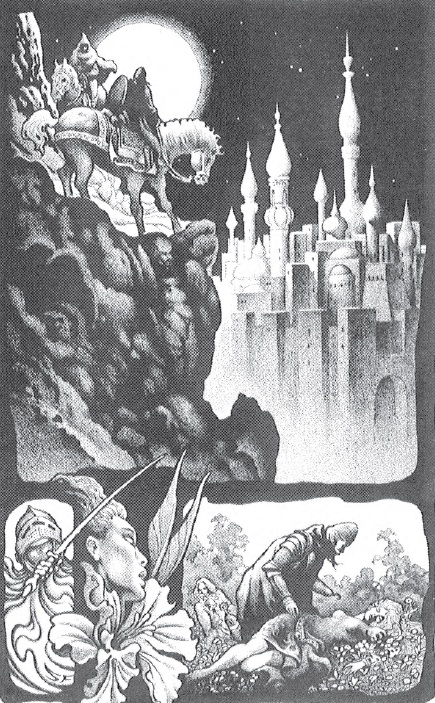 Schweitzer says of the Sir Julian tales: “The idea that theology could actually be a subject in sword-and-sorcery fiction is the most revolutionary thing about these stories. [In the late seventies] if you put anything that even hinted at Christianity into such a story, most editors would run the other way, fearing they were being preached at. Admittedly, it is rather hard to write about the European Middle Ages without mentioning religion here and there.”
Schweitzer says of the Sir Julian tales: “The idea that theology could actually be a subject in sword-and-sorcery fiction is the most revolutionary thing about these stories. [In the late seventies] if you put anything that even hinted at Christianity into such a story, most editors would run the other way, fearing they were being preached at. Admittedly, it is rather hard to write about the European Middle Ages without mentioning religion here and there.”
Yet Schweitzer is quick to specify that he was not making any personal religious statement with these tales of dark adventure: “It is not so much a matter of what I believe as what the viewpoint character believes. A surprising number of people are unable to make that leap.”
Julian survives his brush with Satan, but his holiness does not. Still he remains the wandering hero, battling evil even as it consumes him. Knowing he is beyond redemption, he seeks it anyway. Ultimately he is too human to be a perfect knight. His humanity lies in direct opposition to the tenets of his knightly faith. Being “only human,” he can only fail at trying to be a perfect knight. We’re left with the idea that to be a perfect knight requires the abandoning of one’s innate humanity. Yet it’s the seething humanity of Sir Julian that makes us identify with him. It’s also what makes him an unforgettable protagonist.
“Indeed, I had killed a man in another town. He was an arrogant braggart of high birth. For two hours I sat across a room listening to him as his wine cup brought more and more incredible lies out of him. According to his account he had conducted the Crusade all by himself, personally slain every pagan Satan had ever smiled upon, and at last, as if that were not enough, been singularly honored with a miraculous vision of the Virgin in which he had learned of his own future as the one who would teach righteousness to all Christendom by means of an epic poem he would be inspired to write. He called for a harp and one was brought, and he began to sing—or croak really since his voice was fit only for a swamp at night—a verse or two of his allegedly wondrous creation, whereupon I could stand no more and demanded of him why his hands lacked the hardness known to all but the pampered, why his face showed not the touch of the desert heat, why he described wrongly the many things in the East which I had seen (he thought the Sphinx was a kind of dog) and why, above all, his poetry was such drivel.”
–WE ARE ALL LEGENDS
The author credits his main inspiration for these stories as Ingmar Bergman’s classic 1957 movie THE SEVENTH SEAL, which tells the story of a medieval knight (Max von Sydow) who plays a game of chess with the personification of Death. “The main theme of THE SEVENTH SEAL is the silence of God,” says Schweitzer. “Why does God not speak to us? If he does not exist, as [Bergman’s] knight suggests, does that mean that life is a meaningless horror? There is a powerful scene in which [Bergman’s knight] confronts a witch about to be burnt. He wants to know if she has seen the Devil. He would like to ask the Devil about God. But she is a poor, tortured, deluded girl who knows nothing. Death is real, but Death reveals no secrets.”
Schweitzer also cites C. L. Moore’s “Jirel of Joiry” and “Northwest Smith” stories as inspiration for his early Sir Julian tales. “I wrote and submitted the rough outline of the first story, ‘The Lady of the Fountain,’ to an exercise at the Clarion workshop in 1973,” he says. “None of the stories are Arthurian, though there is a thread running through it of references to the career of Merlin before he encountered Arthur. Merlin bound the witches in ‘Midnight, Moonlight, and the Secret of the Sea’ before Julian loosed them. If the Arthurian mythos is about how a golden age ended and sank into a dark age, Julian lives in a time that is even darker still.”
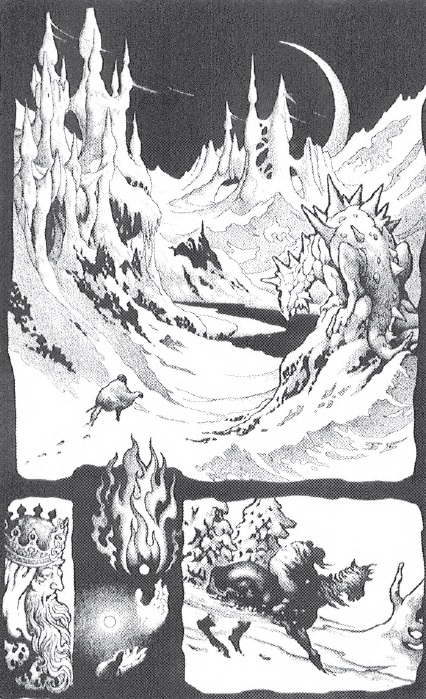 Not only does Julian’s doom carry him across the roads of Europe and the East, but also into weird and haunted lands not found on any map. Along with plenty of thrilling adventure and supernatural weirdness, the author says that Sir Julian’s saga explores “the existential crisis that must come in a religion-based worldview if God, inconveniently, doesn’t exist, or is not good. This is the Problem of Pain. Why is there suffering in the world? Philosophers and theologians have been working on that one for a long time.”
Not only does Julian’s doom carry him across the roads of Europe and the East, but also into weird and haunted lands not found on any map. Along with plenty of thrilling adventure and supernatural weirdness, the author says that Sir Julian’s saga explores “the existential crisis that must come in a religion-based worldview if God, inconveniently, doesn’t exist, or is not good. This is the Problem of Pain. Why is there suffering in the world? Philosophers and theologians have been working on that one for a long time.”
One critic called Julian’s journey through these stories a “phantasmagorial tour de force through various mythologies,” as his hope of salvation continues to slip away. These stories explore the terror that follows a shattering loss of faith, both in the self and in a higher power. Yet, with all this pathos and philosophical context, WE ARE ALL LEGENDS is first and foremost a collection of adventure stories.
Thanks to Schweitzer’s lyrical style and unhindered imagination, this is the cream of the crop when it comes to purest Dark Fantasy. Lessons well-learned from Lord Dunsany, Clark Ashton Smith, Robert E. Howard, Michael Moorcock, and H.P. Lovecraft create flowing, addictive prose that takes you straight into the wonder and mystery of Julian’s dark world.
“Beyond was a land of reversed light and shadow. The sky was a brilliant white, but all the trees and stones, and later deserted towns and curiously crafted castles on the hilltops, were dark. Little patches of brightness hid beneath the leaves and behind the stones, where shadows would normally be. But the stranger ahead of me remained dark, and our horses were the color of midnight.”
— WE ARE ALL LEGENDS
Reviewer Cynthia Ward describes a few of the stories:
“In The Lady of the Fountain, Julian’s encounter with a lamia may destroy both the knight and his closest companion. In The Veiled Pool of Mistorak, Faerie lords send Julian on a grim quest to find a city that exists no more and a man doomed ever to live. In The One Who Spoke with the Owls, the penniless knight accepts a job before learning its terms and wakes to discover he has been hired to slay a pagan witch. The Castle of Kites and Crows presents a vision of cosmic reality that will chill the soul of anyone raised in a Christian faith.”
In his introduction to the book L. Sprague de Camp wrote: “These dreamy — often nightmarish — narratives are mood pieces, the mood of which the author achieves with deceptive ease. The reader ends with the feeling that he has undergone a strange and haunting experience.”
S.P. Somtow gave the book high praise in Fantasy Newsletter: “WE ARE ALL LEGENDS contains not a few sparks of genuine dementia, of wild originality which will surely reward the reader. . . . What a brilliantly berserk, schizoid universe Schweitzer has manufactured! WE ARE ALL LEGENDS has none of the cozy cuteness of standard fantasy worlds.”
Perhaps publisher Wildside Press best sums up the genius of Sir Julian in a handy nutshell: “…a knight whose quest for meaning and salvation leads him into the realms of nightmare, where monsters abound, the Devil may (or may not) rule, all is deception, and sorcerers and lamias may (or may not) know the way to Heaven. If Philip K. Dick had written sword-and-sorcery, it might have come out like this.”
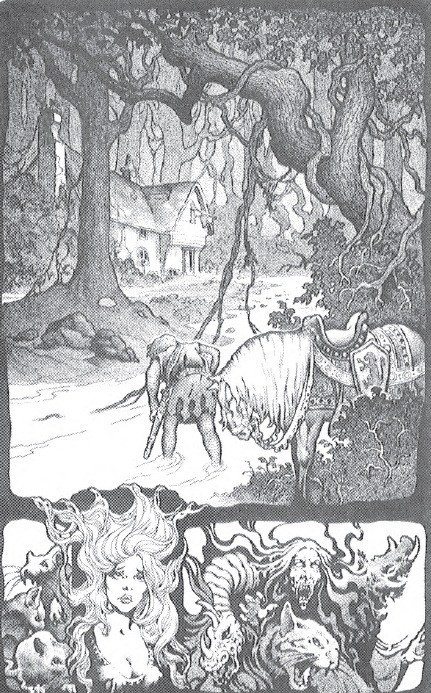 Schweitzer’s existential approach is one of the book’s greatest pleasures. These stories offer terrific sword and sorcery action, a doomed quest through all the trappings of nightmare, but they also reach high into the realm of metaphysical truth and the objective vs. subjective nature of reality. Readers can enjoy them on the surface—brilliantly dark fantasy adventures—or revel in dissecting the layers of symbolism and philosophical implications of the stories.
Schweitzer’s existential approach is one of the book’s greatest pleasures. These stories offer terrific sword and sorcery action, a doomed quest through all the trappings of nightmare, but they also reach high into the realm of metaphysical truth and the objective vs. subjective nature of reality. Readers can enjoy them on the surface—brilliantly dark fantasy adventures—or revel in dissecting the layers of symbolism and philosophical implications of the stories.
You can also see here the growing skill and mastery of storytelling that would lead Schweitzer eventually to write his acclaimed novel MASK OF THE SORCERER, wherein he perfected his transcendent vision of sublime dark fantasy.
WE ARE ALL LEGENDS belongs on any list of dark fantasy must-reads, and it completely reinvents the Arthurian-style quest tale by turning the tropes of knightly ballads upside down and taking a stark, unwavering view of human nature itself as antithetical to religious puritanism. But don’t let a statement like that fool you: The gore quotient is very high here, from the brutal atrocities of the Crusades to a crawling horde of severed hands.
“Waking and dream had become confused. In one state or the other a huge serpent took me in its coils. I felt them wrap around my body, cold, dry, and implacable, firm but not crushing. I was carried up the mountain to a level place, there put in the arms of a horned centaur whose flesh was shiny coal-black as night, and brought into the castle through a secret door. There was no sound. The voices of the woodland were silent. Above, clouds covered the moon.” –WE ARE ALL LEGENDS
Lastly, I’ve got to mention the amazing illustrations by Stephen Fabian that appear throughout the book. Fabian and Schweitzer have long had a sort of “telepathy”; the art he does for Schweitzer’s tales is always pitch-perfect and usually exceeds even the readers’ own imagination. All the images accompanying this article come from the book’s interiors.
WE ARE ALL LEGENDS is available from Amazon.com or from WildsidePress.com. You can even go to eBay for a signed copy directly from the author. If you haven’t read any Schweitzer yet, it’s a great way to discover his superb body of work. And if you’re a Schweitzer fan already but missed this collection, you’re about to unearth a lost treasure of dark literature.
“You’ll go on and on. Your life and your sorrows are not over yet.
You amuse us too much with your rebellion, Julian, and with your despair. No rest for you.”
–WE ARE ALL LEGENDS
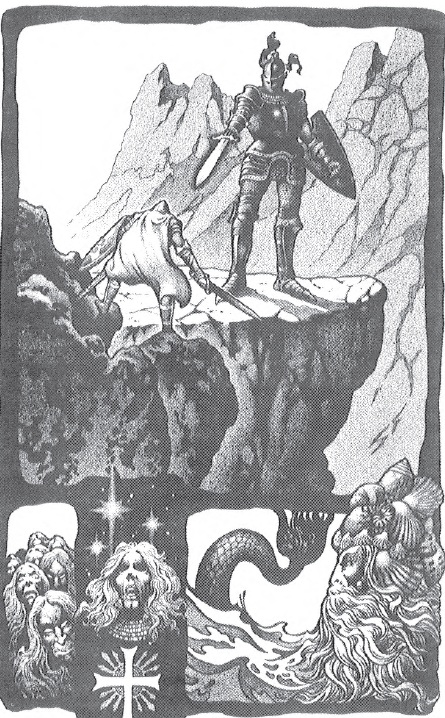
[…] http://www.blackgate.com/2011/11/10/sir-julian-the-apostate-doomed-knight-tragic-hero/ […]
Thanks for the great write-up! Definitely going to be on the lookout for these.
Interesting, I may need to ILL this.
Fultz: Incredible write-up my friend. As I read Seven Princes I see so many great S&S writers in your work, and you’ve done them proud, but this book seems of particular interest to you and thus I MUST read it.
As for Fabian, I’ve never been a huge fan, but his work here looks like some of his more inspired stuff. Sometimes writing lends to the artist, and vice versa, so I would agree with you saying a kind of telepathy exists between the two.
All-in-all an inspiring write-up.
Just received We Are All Legends in the mail. Loved it so far, although not at lovely of word as Howard, or you for that matter John. However, Fabian is knocking it out of the park! Man he’s got it going in some stunning b/w.
[…] http://www.blackgate.com/2011/11/10/sir-julian-the-apostate-doomed-knight-tragic-hero/ […]